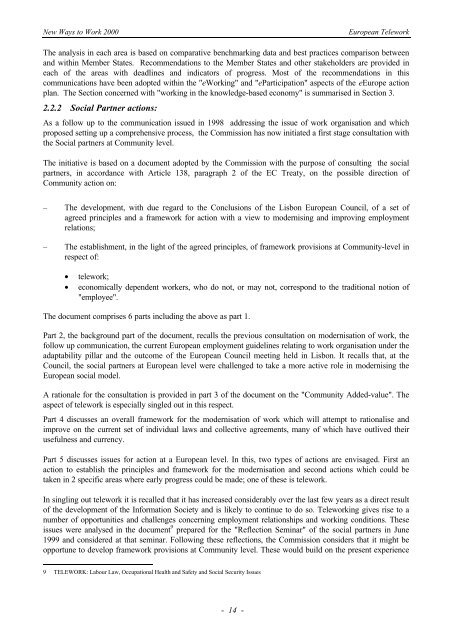eWORK 2000 - European Telework Week
eWORK 2000 - European Telework Week
eWORK 2000 - European Telework Week
- No tags were found...
You also want an ePaper? Increase the reach of your titles
YUMPU automatically turns print PDFs into web optimized ePapers that Google loves.
New Ways to Work <strong>2000</strong><strong>European</strong> <strong>Telework</strong>The analysis in each area is based on comparative benchmarking data and best practices comparison betweenand within Member States. Recommendations to the Member States and other stakeholders are provided ineach of the areas with deadlines and indicators of progress. Most of the recommendations in thiscommunications have been adopted within the "eWorking" and "eParticipation" aspects of the eEurope actionplan. The Section concerned with "working in the knowledge-based economy" is summarised in Section 3.2.2.2 Social Partner actions:As a follow up to the communication issued in 1998 addressing the issue of work organisation and whichproposed setting up a comprehensive process, the Commission has now initiated a first stage consultation withthe Social partners at Community level.The initiative is based on a document adopted by the Commission with the purpose of consulting the socialpartners, in accordance with Article 138, paragraph 2 of the EC Treaty, on the possible direction ofCommunity action on:– The development, with due regard to the Conclusions of the Lisbon <strong>European</strong> Council, of a set ofagreed principles and a framework for action with a view to modernising and improving employmentrelations;– The establishment, in the light of the agreed principles, of framework provisions at Community-level inrespect of:• telework;• economically dependent workers, who do not, or may not, correspond to the traditional notion of"employee".The document comprises 6 parts including the above as part 1.Part 2, the background part of the document, recalls the previous consultation on modernisation of work, thefollow up communication, the current <strong>European</strong> employment guidelines relating to work organisation under theadaptability pillar and the outcome of the <strong>European</strong> Council meeting held in Lisbon. It recalls that, at theCouncil, the social partners at <strong>European</strong> level were challenged to take a more active role in modernising the<strong>European</strong> social model.A rationale for the consultation is provided in part 3 of the document on the "Community Added-value". Theaspect of telework is especially singled out in this respect.Part 4 discusses an overall framework for the modernisation of work which will attempt to rationalise andimprove on the current set of individual laws and collective agreements, many of which have outlived theirusefulness and currency.Part 5 discusses issues for action at a <strong>European</strong> level. In this, two types of actions are envisaged. First anaction to establish the principles and framework for the modernisation and second actions which could betaken in 2 specific areas where early progress could be made; one of these is telework.In singling out telework it is recalled that it has increased considerably over the last few years as a direct resultof the development of the Information Society and is likely to continue to do so. <strong>Telework</strong>ing gives rise to anumber of opportunities and challenges concerning employment relationships and working conditions. Theseissues were analysed in the document 9 prepared for the "Reflection Seminar" of the social partners in June1999 and considered at that seminar. Following these reflections, the Commission considers that it might beopportune to develop framework provisions at Community level. These would build on the present experience9 TELEWORK: Labour Law, Occupational Health and Safety and Social Security Issues- 14 -








